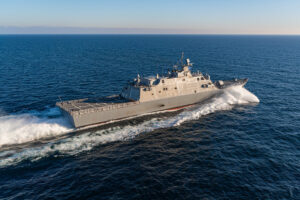NATIONAL HARBOR, Md. — The Navy is set to test a fix to the Freedom-variant Littoral Combat Ship (LCS) engine next month, but currently deployed ships may have to wait years for the fix.
In January, the Navy
stopped accepting delivery of the variant due to a material defect in the combining gear and would only resume once a fix was installed and tested on ships following land-based testing (Defense Daily, Jan. 22).
Speaking at a briefing during the Navy League’s annual 2021 Sea Air Space expo here, Howard Berkof, deputy program manager at the Littoral Combat Ship program office (PMS 501), explained the combining gear integrates the ship’s gas turbines and diesel engines to allow maximum speed and power output from both at the same time, called the CODAG mode.
The Navy, Freedom-variant prime contractor Lockheed Martin [LMT], and combining gear original manufacturer RENK AG conducted a root cause analysis that concluded the two bearings on the high-speed clutch were not sufficient for the load. Berkof said the Navy then implemented a design change to change out the ball bearings for journal bearings.
“We completed the hardware and conducted land-based testing in the springtime in Augsberg, Germany at RENK’s facility there,” Berkof said.
The service deemed the land-based testing successful in April and Lockheed Martin has been implementing the fix on the future USS Minneapolis-Saint Paul at the port town Escinaba, Mich.

Since the Navy paused accepting new Freedom-variant LCSs until the fix is finalized, the Navy had to move LCS-21 from the Fincantieri Marinette Marine shipbuilder in Marinette, Wis., to Escinaba because the shipbuilder has limited waterfront space.
Marinette Marine performs Freedom-variant construction under Lockheed Martin.
“The combing gear fix has been implemented and we are now putting the ship back together. It’s a very complex fix to replace the bearings on the combining gear. It’s a very tight space, a lot of interferences had to be removed,” Berkof added.
“We completed that. We’re in the process of putting the ship back together and we will conduct at-sea testing of LCS-21” by late September.
Once the combining gear fix is validated at sea on LCS-21, the Navy expects to continue implementing the fix across new construction and in-service ships affected.
Berkof said the future USS Cooperstown (LCS-23) will also soon move to Escinaba to undergo its combining gear replacement.
Following those vessels, he said the future USS Marinette (LCS-25), Nantucket (LCS-27) and Beloit (LCS-29) will “get their combining gear in stride in new construction” because the old combining gear was previously installed on this. However, the future USS Cleveland (LCS-31) will get a new combining gear up front because it is at an earlier stage of construction.
Berkof said his office is working closely with the fleet to determine timing of availabilities for when deployed ships will receive the combining gear fix but said it will occur over “the next several years.”
“We’re working closely with the fleet to make sure that we have the time, the schedule to make sure that the combining gear design solution is implemented in those availabilities. So we’re working closely, coordinating that schedule. Nothing completely firm at this time, but we’re working toward that.”
Berkof said the Navy and Lockheed Martin are currently discussing cost payment for the combining gear fix, but he did not provide details.
“I will say, in new construction ships it’s relatively straightforward per the terms of the construction contract. As far as in-service ships – we are working, we’re actively in conversations with Lockheed Martin about that, so I really can’t say anything at this time about the cost and the contractual mechanism to do that.”
When pressed on the LCS-21 trial, Berkof claimed the Navy technical community developed a rigorous and “very extensive at-sea test program” that will be roughly double what a normal propulsion test on the ship is.
“So we’re going to go through very rigorous testing off the coast of Escinaba to really make sure that those gears test out at many different modes: diesel-only mode, gas turbine mode, and the CODAG.”
Berkof indicated the Navy intends to complete the engine trials with LCS-21 and LCS-23 within months, in time to sail the ships out of the Great Lakes before the winter freeze, normally in November to December.
He said once the combining gear fix is determined to be successful on the ships, the service will then take delivery of LCS-21 and 23.